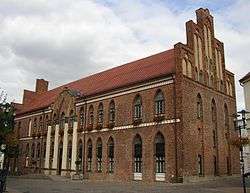Parchim
| Parchim | ||
|---|---|---|
|
Town hall | ||
| ||
 Parchim | ||
Location of Parchim within Ludwigslust-Parchim district  | ||
| Coordinates: 53°25′N 11°50′E / 53.417°N 11.833°ECoordinates: 53°25′N 11°50′E / 53.417°N 11.833°E | ||
| Country | Germany | |
| State | Mecklenburg-Vorpommern | |
| District | Ludwigslust-Parchim | |
| Government | ||
| • Mayor | Bernd Rolly (SPD) | |
| Area | ||
| • Total | 124.49 km2 (48.07 sq mi) | |
| Population (2015-12-31)[1] | ||
| • Total | 17,918 | |
| • Density | 140/km2 (370/sq mi) | |
| Time zone | CET/CEST (UTC+1/+2) | |
| Postal codes | 19370 | |
| Dialling codes | 03871 | |
| Vehicle registration | PCH | |
| Website | www.parchim.de | |
Parchim (German pronunciation: [ˈpaʁçɪm]) is a town in Mecklenburg-Vorpommern, Germany. It is the capital of the Ludwigslust-Parchim district. It was the birthplace of Helmuth von Moltke the Elder, to whom a monument was erected in 1876.
Founded about 1210, it was the seat of the short-lived Lordship of Parchim-Richenberg, a partition of the Duchy of Mecklenburg, from 1226 until 1248 when the lord relocated to Richenberg. Parchim was absorbed into the Lordship of Werle in 1255. In 1277 Werle was partitioned and Parchim became the seat of Werle-Parchim until it was reunited with Werle-Güstrow in 1307. One branch of the family of the duke of Mecklenburg resided in Parchim during part of the 14th century. It became a prosperous industrial town during the 16th century, but this prosperity was destroyed by the Thirty Years' War.
- Town hall


References
External links



![]() This article incorporates text from a publication now in the public domain: Chisholm, Hugh, ed. (1911). "article name needed". Encyclopædia Britannica (11th ed.). Cambridge University Press.
This article incorporates text from a publication now in the public domain: Chisholm, Hugh, ed. (1911). "article name needed". Encyclopædia Britannica (11th ed.). Cambridge University Press.

